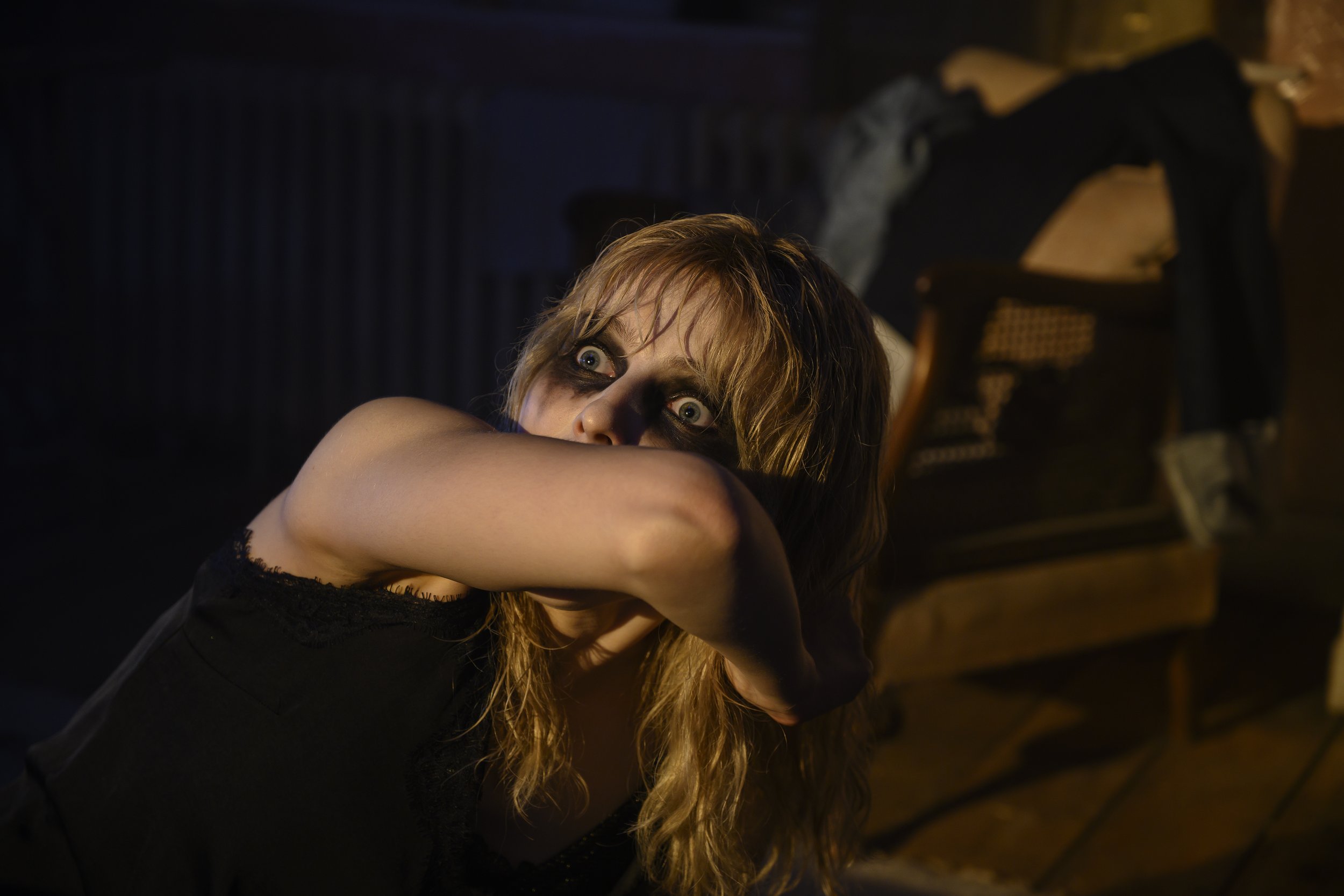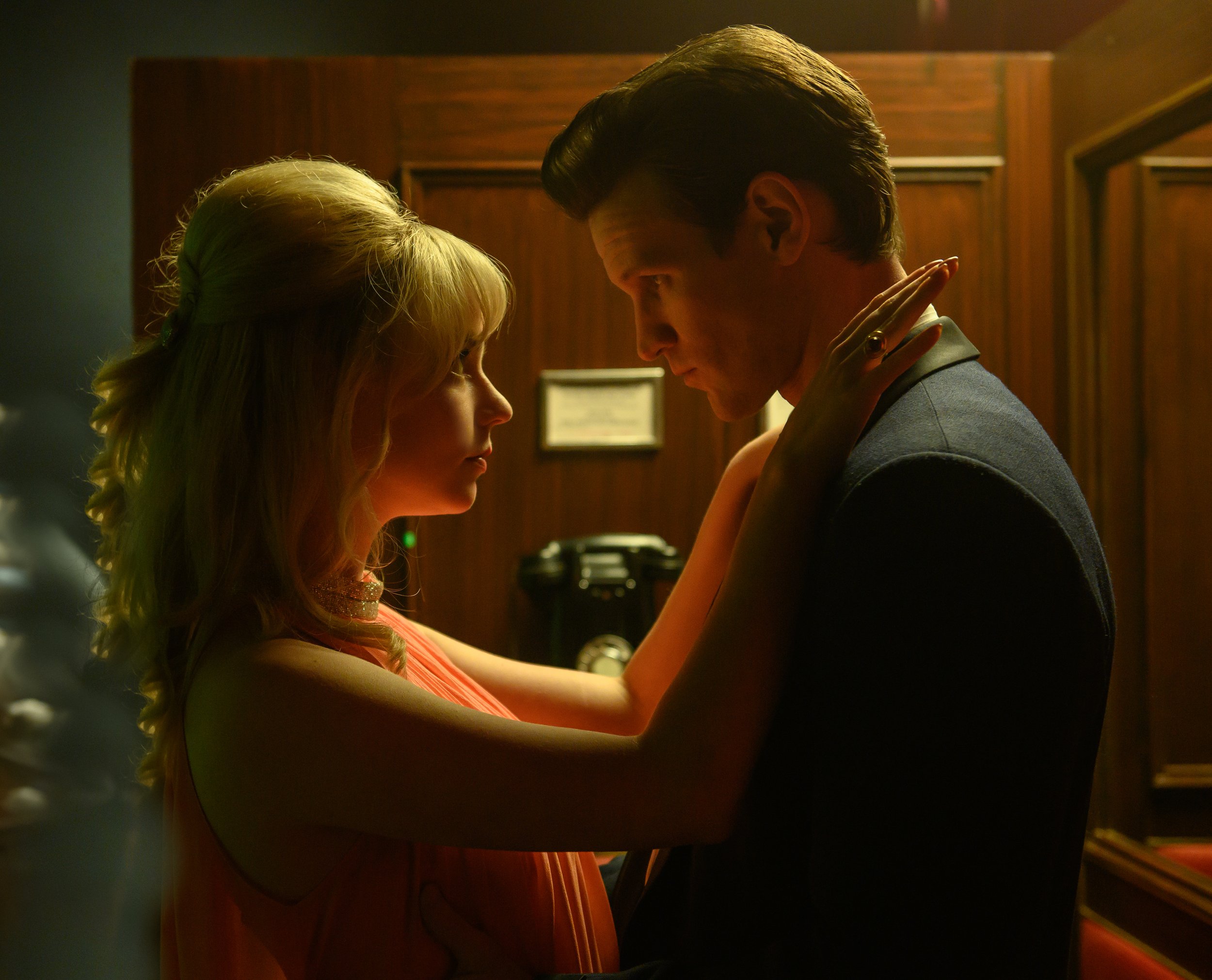[Film Review] Last Night in Soho (2021)
Last Night in SoHo doesn’t feel bold enough to deliver on its more scathing commentary, delivering on cultivated cinematic moments that make it a diverting, if relatively empty vessel.
Eloise (Thomasin McKenzie) is making a big move to London to pursue her fashion dreams. Arriving at university she soon finds it difficult to settle in the big city. Increasingly withdrawn and moved into a room of her own, she immerses herself into a dream-like space in which she can visit the city in the 60s, a time period she adores. Soon, a darker side of the glamour emerges, plunging Eloise into a decades-old secret.
Anti-nostalgia is fast becoming the new nostalgia, with several films starting to take aim at the ‘good old days’ mentality as only being that good if you happened to be a cis, white, heterosexual male with all the power afforded by that status. No doubt assisted by conservative politics adopting nostalgia as a platform, promising to Make America Great Again in the States or discussions of taking back sovereignty in the UK, the idea has come to represent something exclusionary, trying to capitalise on the fondness for the past held by some. Last Night in SoHo feels like a very personal response to that shift, full of love for the music, nightlife and romantic vision of the time, while also grappling with the uglier underbelly of oppression and abuse it provided a glossy sheen to.
Edgar Wright’s previous works have all involved some element of comedy and indeed, there are numerous comic beats to be found in Last Night in SoHo, but the more serious overall tone exposes weaknesses, primarily in the character construction. Someone like Barbara in Shaun of the Dead works as a primarily one-note character whose entire personality boils down to, ‘would hate to make a fuss’, because the gag it hangs on is an undoubtedly funny one that fits the tone of everything else and is supported by an ensemble of other characters that ebb and flow to further the narrative. Here, we are looking for greater depth and come up short, with less characters to share that weight and drive momentum. Krysty Wilson-Cairns shares writing duties, bringing further horror credentials from Penny Dreadful and in some ways, Last Night in SoHo could make for something more compelling in an episodic format.
John (Michael Ajao) is introduced as a contrast to various other male characters, set apart because he is not sleazy, nor a threat, but he’s given very little other characterisation or purpose with his sole function being to swoon over Eloise. That the only moment he is given where he is the focus is woefully misjudged makes this even more frustrating. Ajao’s performance is instantly likeable, he is just not given nearly enough to do. Similarly, Eloise’s classmate Jocasta (Synnove Karlsen) morphs from superficial but reasonably affable fashion student into a cold mean girl with seemingly no explanation other than finding Eloise a little bit too quiet and involved in her ‘granny shit’ music. Thomasin KcKenzie is great as Eloise, whose ability to shrink back as well as take centre stage serves the film well. Anya Taylor Joy is also on excellent form here with a confident performance despite the tried and tested narrative journey she goes on.
Eloise’s quickly spiralling obsession with Sandie (Anya Taylor Joy) is one that feels like both an identification with, but more importantly, a longing for. The switches between the two, including during a slickly choreographed and edited dance sequence involving Jack (Matt Smith) do much to intertwine the pair, merging their worlds. Initially, Sadie is to be looked at, the focus of Eloise’s uncertain and even burgeoningly romantic gaze. Their connection across time allows for the moments where the film gets to lean into its desire to throw horror at the screen and indulge itself in that sharp choreography.
Romantic longing is a focal point for the entire film, with the whole opening segment of the film indistinguishable from the 1960s thanks to Eloise and her gran’s (Rita Tushingham) indulgence in décor and records. Wright cleverly plays with the concept of time, disrupting that early seemingly period setting with a sudden shift to Eloise with large, modern headphones to jolt the viewer out of their initial perceptions. Similarly, Wright’s London photography is always probing the area, indulging in small details. Eloise finds reminders of the past in modern London, bits of iconography that speak to the power and longevity of these spaces, even as they are repurposed. The use of performers like Tushingham and the late, great Diana Rigg cements that desire to delight in the scene of the era, placing them in the modern time frame as wiser, maternal characters for Eloise to interact with.
As is typical for Edgar Wright, Last Night in SoHo manages to weave both references, visual and thematic nods to other films, including Repulsion as well as the trademark running through lines and coded nods that we’ve come to expect. Some are these are profoundly unsubtle, including a costume choice that feels on the nose even for the lack of nuance within the story, especially as it has very narrow roles for women, despite them being the focus. On the other hand, some lines do work to weave and add a layer of meaning, as well as a much-needed bit of levity to counterbalance the film’s darker impulses.
Much of the issue with Last Night in SoHo is that the film is seeking to have both an anti-nostalgic take on the 1960s and a more poignant discussion about the role of misogyny in contemporary life. These discussions are arguably too heavy for the film, with everything working better in the moments where it fully embraces its more schlocky elements, leaning into the slightly tacky (by no means a criticism) horror movie it deeply wants to be. In those moments, the reductive character traits matter less as the sheer appreciation for crafting horror jolts takes over. The background political commentary is too faint, with too little to add and it is where the film loosens its stitches that we see the more able, entertaining film underneath.
Last Night in SoHo is released in UK cinemas on October 29th.






![[Film Review] Flights of Reverie (2025)](https://images.squarespace-cdn.com/content/v1/5fe76a518d20536a3fbd7246/1769111579457-CTUW03G3J34P6SFRWWEM/flights-of-reverie-filmstill-ornithologist-berlin-li-wallis06.jpg)
![[Film Review] Confessions in Static (2025)](https://images.squarespace-cdn.com/content/v1/5fe76a518d20536a3fbd7246/1768397467245-3KOF3LUBRDQVJ8QVDONA/Confessions_Key_Alternate_1920x1080.png)
![[Film Review] Stalker (2025)](https://images.squarespace-cdn.com/content/v1/5fe76a518d20536a3fbd7246/1768232505839-TS9K7YBLOXNQML8PUWTP/Screenshot+2026-01-12+at+15.17.49.png)
![[Film Review] Bone Lake (2025)](https://images.squarespace-cdn.com/content/v1/5fe76a518d20536a3fbd7246/1768151214859-U1AUN7JALKRK4W5NGJVH/Andra+Nechita+and+Maddie+Hasson+in+Bone+Lake+%28Signature+Entertainment%29+1.jpg)
![[Film Review] 28 Years Later: The Bone Temple (2026)](https://images.squarespace-cdn.com/content/v1/5fe76a518d20536a3fbd7246/1768152692285-7TK6SN62JY4H3TJDYABP/The+Bone+temple.jpg)
![[Film Review] Pelverata (2025)](https://images.squarespace-cdn.com/content/v1/5fe76a518d20536a3fbd7246/1767549668681-1TW6BD7QQHK8WS8L4IVT/Screenshot+2026-01-04+at+17.57.01.png)
![[Film Review] A study of the human ability to endure self-inflicted pain in XXXDarknet: Red Lips](https://images.squarespace-cdn.com/content/v1/5fe76a518d20536a3fbd7246/1767542371615-YUJBD442MS9NAGEB45D7/redlips.jpg)














![[Editorial] Oscar Nominations 2026: Where to stream all the horror picks](https://images.squarespace-cdn.com/content/v1/5fe76a518d20536a3fbd7246/1769113319180-4INRRNMZK4DZLHRSUXX5/rev-1-GRC-TT-0026r_High_Res_JPEG-1024x372.jpeg)
![[Editorial] 10 Films & Events to Catch at Soho Horror Film Fest 2023](https://images.squarespace-cdn.com/content/v1/5fe76a518d20536a3fbd7246/1700819417135-299R7L4P0B676AD3RO1X/Screenshot+2023-11-24+at+09.41.52.png)
![[Editorial] 9 Horror Nintendo Switch Games To Play](https://images.squarespace-cdn.com/content/v1/5fe76a518d20536a3fbd7246/1697214470057-3XZXX8N4LYIMDFWS6Z3P/Screenshot+2023-10-13+at+17.20.13.png)
![[Mother of Fears] Mothering in Silence in A Quiet Place (2018)](https://images.squarespace-cdn.com/content/v1/5fe76a518d20536a3fbd7246/1696445921315-HZJ2DZYQIH6VVWXBO2YL/Screenshot+2023-10-04+at+19.52.29.png)
![[Editorial] 5 Female Focused Horror Book Recommendations](https://images.squarespace-cdn.com/content/v1/5fe76a518d20536a3fbd7246/1696441981361-52EQCTJ7AT2QF1927GM7/919xtm6d3fL._AC_UF894%2C1000_QL80_.jpg)
![[Editorial] 9 Best Slashers Released Within 10 Years of Scream (1996)](https://images.squarespace-cdn.com/content/v1/5fe76a518d20536a3fbd7246/1695478839037-LOFHGVM3H6BMSZW7G83M/Screenshot+2023-09-23+at+15.15.11.png)
![[Mother of Fears] Mother Vs. Monster in Silent Hill (2006)](https://images.squarespace-cdn.com/content/v1/5fe76a518d20536a3fbd7246/1695485781119-H6GNP0G3J2TLPAOIABV7/Screenshot+2023-09-23+at+17.11.56.png)
![[Editorial] 9 Terrifying Cerebral Visions in Horror Movies](https://images.squarespace-cdn.com/content/v1/5fe76a518d20536a3fbd7246/1693509801235-X23OL50T1DVGECH0ZJK2/MV5BMjQ0MTg2MjQ4MV5BMl5BanBnXkFtZTgwMTU3NDgxMTI%40._V1_.jpg)

The life of a Silent Hill fan is a turbulent one. For every Silent Hill 3, there’s a Silent Hill: Homecoming. For every Silent Hill 2 Remake, there’s a Silent Hill: Ascension. For every Silent Hill f, there’s a Return to Silent Hill, and thus, the pendulum continues to swing, this time into frustrating - but expected - disappointment.